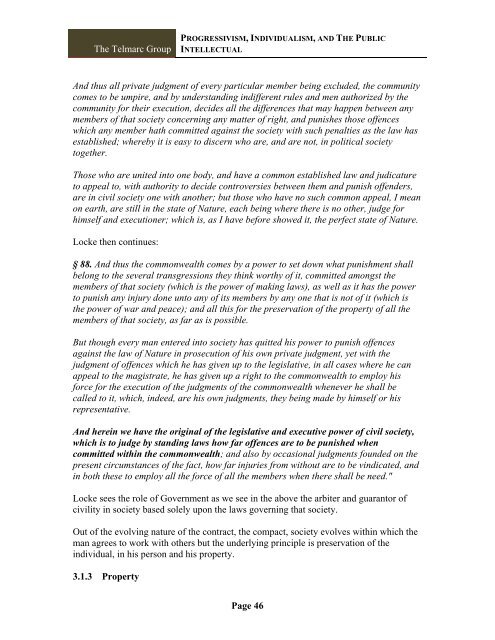progressivism, individualism, and the public ... - Telmarc Group
progressivism, individualism, and the public ... - Telmarc Group
progressivism, individualism, and the public ... - Telmarc Group
Create successful ePaper yourself
Turn your PDF publications into a flip-book with our unique Google optimized e-Paper software.
The <strong>Telmarc</strong> <strong>Group</strong><br />
PROGRESSIVISM, INDIVIDUALISM, AND THE PUBLIC<br />
INTELLECTUAL<br />
And thus all private judgment of every particular member being excluded, <strong>the</strong> community<br />
comes to be umpire, <strong>and</strong> by underst<strong>and</strong>ing indifferent rules <strong>and</strong> men authorized by <strong>the</strong><br />
community for <strong>the</strong>ir execution, decides all <strong>the</strong> differences that may happen between any<br />
members of that society concerning any matter of right, <strong>and</strong> punishes those offences<br />
which any member hath committed against <strong>the</strong> society with such penalties as <strong>the</strong> law has<br />
established; whereby it is easy to discern who are, <strong>and</strong> are not, in political society<br />
toge<strong>the</strong>r.<br />
Those who are united into one body, <strong>and</strong> have a common established law <strong>and</strong> judicature<br />
to appeal to, with authority to decide controversies between <strong>the</strong>m <strong>and</strong> punish offenders,<br />
are in civil society one with ano<strong>the</strong>r; but those who have no such common appeal, I mean<br />
on earth, are still in <strong>the</strong> state of Nature, each being where <strong>the</strong>re is no o<strong>the</strong>r, judge for<br />
himself <strong>and</strong> executioner; which is, as I have before showed it, <strong>the</strong> perfect state of Nature.<br />
Locke <strong>the</strong>n continues:<br />
§ 88. And thus <strong>the</strong> commonwealth comes by a power to set down what punishment shall<br />
belong to <strong>the</strong> several transgressions <strong>the</strong>y think worthy of it, committed amongst <strong>the</strong><br />
members of that society (which is <strong>the</strong> power of making laws), as well as it has <strong>the</strong> power<br />
to punish any injury done unto any of its members by any one that is not of it (which is<br />
<strong>the</strong> power of war <strong>and</strong> peace); <strong>and</strong> all this for <strong>the</strong> preservation of <strong>the</strong> property of all <strong>the</strong><br />
members of that society, as far as is possible.<br />
But though every man entered into society has quitted his power to punish offences<br />
against <strong>the</strong> law of Nature in prosecution of his own private judgment, yet with <strong>the</strong><br />
judgment of offences which he has given up to <strong>the</strong> legislative, in all cases where he can<br />
appeal to <strong>the</strong> magistrate, he has given up a right to <strong>the</strong> commonwealth to employ his<br />
force for <strong>the</strong> execution of <strong>the</strong> judgments of <strong>the</strong> commonwealth whenever he shall be<br />
called to it, which, indeed, are his own judgments, <strong>the</strong>y being made by himself or his<br />
representative.<br />
And herein we have <strong>the</strong> original of <strong>the</strong> legislative <strong>and</strong> executive power of civil society,<br />
which is to judge by st<strong>and</strong>ing laws how far offences are to be punished when<br />
committed within <strong>the</strong> commonwealth; <strong>and</strong> also by occasional judgments founded on <strong>the</strong><br />
present circumstances of <strong>the</strong> fact, how far injuries from without are to be vindicated, <strong>and</strong><br />
in both <strong>the</strong>se to employ all <strong>the</strong> force of all <strong>the</strong> members when <strong>the</strong>re shall be need."<br />
Locke sees <strong>the</strong> role of Government as we see in <strong>the</strong> above <strong>the</strong> arbiter <strong>and</strong> guarantor of<br />
civility in society based solely upon <strong>the</strong> laws governing that society.<br />
Out of <strong>the</strong> evolving nature of <strong>the</strong> contract, <strong>the</strong> compact, society evolves within which <strong>the</strong><br />
man agrees to work with o<strong>the</strong>rs but <strong>the</strong> underlying principle is preservation of <strong>the</strong><br />
individual, in his person <strong>and</strong> his property.<br />
3.1.3 Property<br />
Page 46












